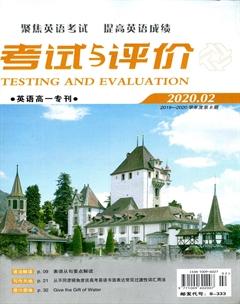Questions & Answers
春花
【问】 编辑老师您好,下面这道题请您帮我分析一下。
—Thank you for fixing my computer.
—____.
A. It's a pleasure B. With pleasure
C. It's easy D. I'm glad
我觉得A和B都对,这两个选项有什么区别吗?
(江苏东台 丁 楠)
【答】 It's a pleasure. 与You are welcome. 意义相同,用于别人向你道谢时,意为“不用谢,别客气”。如:
—Thank you for coming to see me. 谢谢你来看我。
—It's a pleasure. 不用谢。
With pleasure. 与All right, No problem, I'd like to... 等习语意义相同,用于别人请求你做某事,你表示“很乐意去做”的时候。如:
—Could you post the letter for me? 你能帮我把这封信寄出吗?
—With pleasure. 愿意效劳。
从另一个角度来说,It's a pleasure. 常用于事情发生之后,别人向你表示感谢时;而With pleasure. 用于事情发生之前,别人问你是否愿意为他效劳时。
所以,本题的正确答案为A项。
【问】 编辑老师,我想向您请教一个问题:
It is ____ he often comes late to school ____ makes the teacher angry.
老师给的答案是that; that, 但是我想问一下第二个空用what 为什么不行呢?老师用的是强调句式,但我认为也可以是what makes the teacher angry 作主语,it作形式主语,还原过来就是 What makes the teacher angry is that he often comes late to school. 这有什么错误吗?
(山东青岛 王永嘉)
【答】 这道题老师给的答案是正确的。第一个that引导的是一个主语从句,第二个that与it is构成强调句式。此题为:It is that he often comes late to school that makes the teacher angry. 意为“是他经常上学迟到使老师生气。”
如果像你所说,第二个空填what,此句就成为:It's that he often comes late to school what makes the teacher angry. 第二个空不能填what,因为what作为引导词需要在句子里充当成分,而此句并不缺少任何句子成分,因此这句话就不能理解成为 what makes the teacher angry 作主语,it作形式主语。虽然,What makes the teacher angry is that he often comes late to school. 这句话是正確的,但是这句话并不是由本题的句子还原过来。如果要用it作形式主语,此句可变为:It makes the teacher angry that he often comes late to school. 可还原为:That he often comes late to school makes the teacher angry.
【问】 我遇到这样一道英译汉的题:That's the way he was raised. 老师说raise在这里是“抚养大,教育”的意思,那它和bring up有什么区别呢?
(四川凉山 王 博)
【答】 bring up和raise都有“抚养大,教育”的意思,只是bring up较常用。如:
I was brought up by my uncle. 我是叔叔带大的。
She was born in Boston but brought up in New York. 她出生在波士顿,但是在纽约长大。
bring up常可用副词修饰,表示“教养如何”。如:
Mary is a nicely brought up girl. 玛丽是一个教养很好的姑娘。
在美国常用raise表示“抚养大,教育”。如:
We want to raise our children to be decent men and women. 我们要把孩子们培养成正派人。
你所问的句子意为:他就是这样被抚养大的。
【问】 I was the only person in my office who was invited. 请问这里的who是否应改为that?
(新疆喀什 李 悦)
【答】 此句中的who不能改为that。通常情况下,当被修饰的名词前有only, all, any, few, little, no, one of等修饰时,关系代词常用that或省略that (当that作宾语时)。如:
The only thing that impress me is her directness. 唯一给我留下深刻印象的是她的直率。
It was the only cotton mill (that) there was then. 那时它是唯一的一家棉纺织厂。
但是这一点只能作为that与which择用时的标准,并不能与who相混淆。也就是说当先行词为人时,即使其前受only, all, any, no等词修饰,关系代词都既可用that, 也可用who。如:
There is no one who / that we believe is competent. 我们认为能胜任的人一个也没有。
作定语从句一类题时,虽然有一些固定用法,如that与which的择用;which与as的选择等,但这些规则在使用时一定要注意不可生搬硬套。
【問】 Jack was the first ____ one to leave the classroom.
A. to B. of C. but D. before
答案选C。请问这里的but是什么意思?可以省去吗?
(黑龙江大庆 孙 茜)
【答】 本题中涉及到介词but构成的固定短语用法。the first but one (two, three)意为“第二(三、四)”,the last but one (two, three)意为“倒数第二(三、四)”。如:
He was the last but one to arrive. 他是倒数第二个到达的。
掌握了but的这个用法,本题正确答案很容易就可选出。在英语中,习惯用法、固定搭配多种多样,在平时学习中遇到类似的用法时,要做好积累。
【问】下面这道题为什么填is expected而不是will be expected?
—It has been so foggy recently.
—Cheer up! The fog ___ to clear up from tomorrow.
(陕西咸阳_许_樱)
【答】这道题考查一般现在时表将来时。表示按规定、时间表、计划或安排要发生的动作。如:
Are you on duty next weekend? 下周末你值班吗?
Where do we go now? 我们现在到哪里去?
注意:在此用法中,句中通常有具体的时间状语。
如果你有什么不解和疑惑,欢迎通过电子邮件或信件的形式,第一时间和我们联系。
来信请寄:吉林省通化市西昌工贸开发区2号天仁报业集团《考试与评价》英语高一专刊 邮编:134001
Email: 15713765@qq.com

